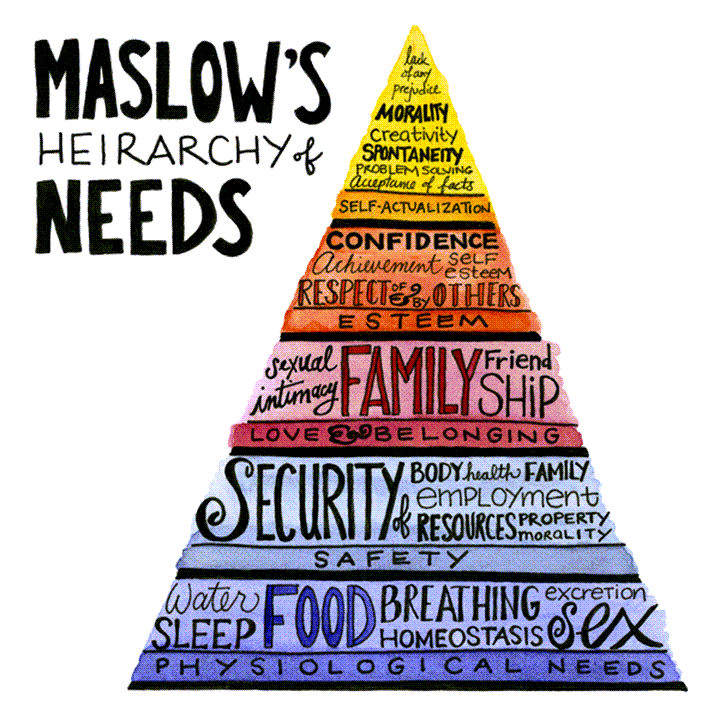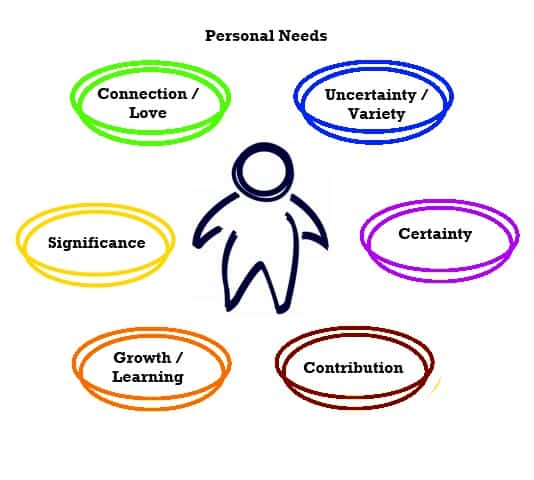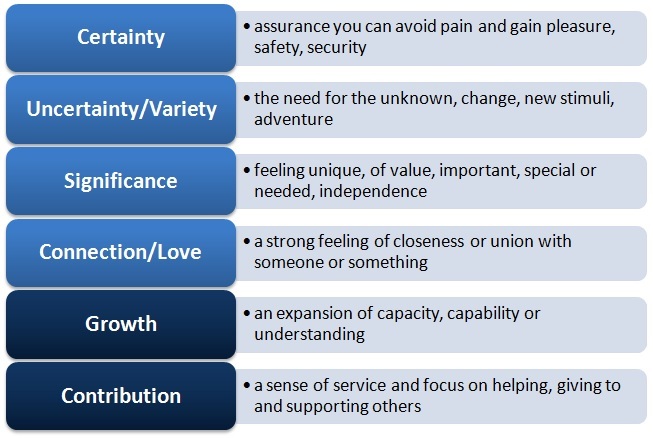When the Need for Growth is Important to You

Let’s first review Abraham Maslow’s theory of human needs. In 1943, Abraham Maslow proposed the hierarchy of psychological needs, illustrating an order of human motivation.
It is often depicted as a pyramid because Maslow initially suggested that we must satisfy our Physiological Needs first, followed by our need for Safety, Love, and a Sense of Belonging, then Self-Esteem, and finally, Self-actualization in that order.
Maslow later clarified that the order in the hierarchy “is not nearly as rigid” as he originally implied.
For example, for some, the need for Self-Esteem could be more important than the need for Love. For others, the need for creative fulfillment may supersede even the most Basic Needs.

For these reasons, Cloé Madanes, a world-renowned innovator and teacher of family and strategic therapy, separated the Emotional areas from the Physical and reworked the needs into “The Six Human Needs.“
Cloé explains that the Six Human Needs are not “Desires” but actual “Psychological Needs” that we continually try to satisfy consciously and subconsciously.
Your needs influence your deepest motivations and determine how you prioritize your decisions and actions throughout your life.
If you try to meet those needs that are not in line with your values, you will experience conflict and discontent.
Conversely, when you can align your needs with your highest values, you will feel more fulfilled and complete.

The Six Human Needs work in pairs: Certainty with Variety, Significance with Love and Connection, and Growth with Contribution.
The first two pairs are in constant search of balance.
When you feel that you don’t have enough of one of the needs when you have too much of the other.
On the other hand, the bottom two needs, Growth, and Contribution, can grow separately or together.
What is the Need for Growth?

- You must constantly develop new skills, learn new things, and improve your knowledge.
- You must develop yourself physically, emotionally, intellectually, and spiritually.
- You need to be constantly growing.
The need for Growth means that you continually strive to learn new skills, gather knowledge, and improve yourself.
You have this picture of yourself in the future — of how you desire to be.
And your need for Growth pushes you to reach for that ideal self. So when the need for Growth is at its highest, you continuously strive to grow emotionally, spiritually, physically, financially, and intellectually.
Growth is a crucial aspect of life. If you’re not growing, you’re making no real progress. However, Growth isn’t necessarily about learning a new skill or reading a good book.
It’s more about the time you put into self-reflection.
Moreover, it’s about your mindful approach to understanding the consequences of your daily decisions, choices, and actions.
Growth isn’t a primary need, which means it’s not something everyone strives to fulfill. However, it’s an essential need because, without Growth, there is a lack of dissatisfaction.
Without Growth, your life may even feel as though it’s stagnating. Yet, on the surface, you may be fulfilling the four primary needs:
- You’re comfortable.
- You experience some uncertainty.
- You feel significant.
- You also satisfy your need for connection.
However, if you’re not growing and evolving psychologically, you will feel dissatisfied and unfulfilled, and you will not know why.
How Growth Serves You
- There is always a new challenge and something new to learn.
- You’re not dependent on others to find joy in learning. Instead, you’re self-sufficient and active in your pursuits.
- You’re not attached to material possessions.
- It’s not about what you have but what you know and can do.
How Growth Hurts You
- Connecting and giving to others can be more fulfilling than acquiring new knowledge and skills.
- There can be more pleasure in sharing than in accumulating knowledge.
- You can be seen as reserved and unwilling to share.
- You can become detached and overly private.
- You tend to under-value relationships.
Growth Focus
- You focus on learning, studying, developing skills, and being your best.
Growth Energy
- You conserve your energy and focus away from feelings to learn everything there is to be understood.
- You are self-contained and set careful limits to protect your time and privacy.
Growth Health
- If your need to grow is tied to your physical development, you will do whatever is necessary to stay healthy and fit.
Growth Avoidance
- You will do anything to avoid feeling inadequate or drained.
- You avoid demands and intrusions on privacy that allow you to focus on your personal Growth.
Growth Strengths
- You’re respectful of others.
- You’re thoughtful, calm, and dependable.
- You like to think that you’re a model of self-improvement for others.
Growth Communication Style
- People might see you as distant because you like to focus on content and facts.
- Words that you use frequently are you, you, yourself, know, learn, grow, develop, understand, analyze, accomplish, and goals.
Growth Stress
- You’re stressed when you feel tired or dependent on others.
- Intrusions on your privacy are stressful to you.
Growth Defensiveness
- You become defensive when there are intrusions or limitations on what you want to do.
- You can become angry when people interfere with your need for privacy.
Growth Emotions
- You’re careful when expressing emotions but can have temper outbursts when intruded upon.
Your Goal for Achieving Balanced Growth
Your Goal for achieving balance is to enjoy relationships and connections with people.
What to do?
- You must experience joy and pleasure in many ways, not just by learning.
- It would be best to find balance in life by focusing more on others than on your Growth and development.
- You need to experience pleasure in giving, be less reserved, and prioritize Love and relationships.
- You need to take better care of those you love.
What interferes with your Goal?
- The belief that you are worthy if you don’t constantly improve yourself.
- The importance that you give to privacy interferes with your Goal.
- It would be best if you Recognized that you could appear self-centered.
How can others support you?
- Others can appreciate your ability to be self-sufficient and independent, your willingness to live and let live, and your social and loving nature while encouraging you to be more social.
Growth Advice
- It would be best to find balance by focusing more on others.
- You need to experience pleasure in giving, be less reserved, and prioritize Love and relationships.
- You need to take better care of those you love.

